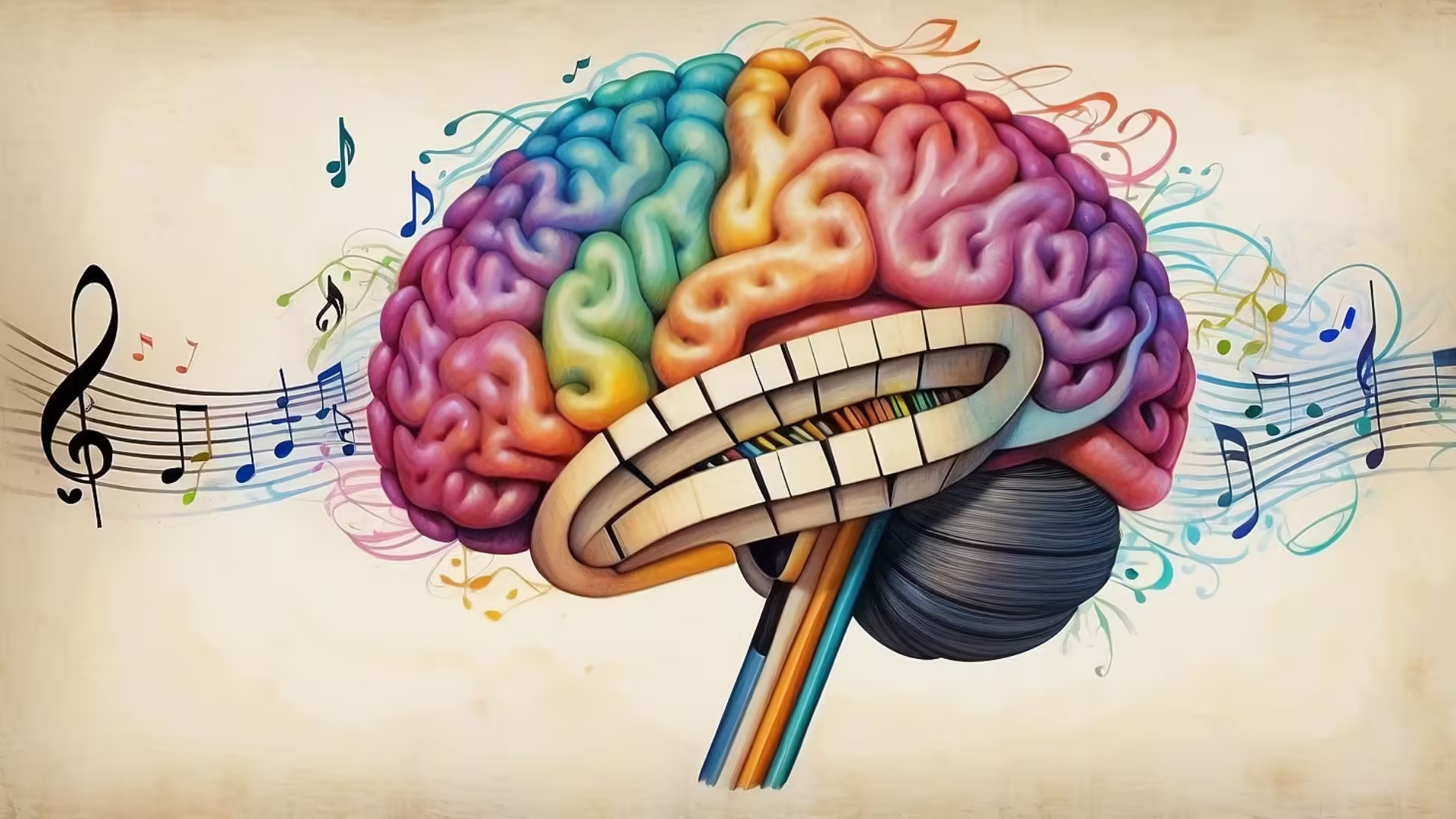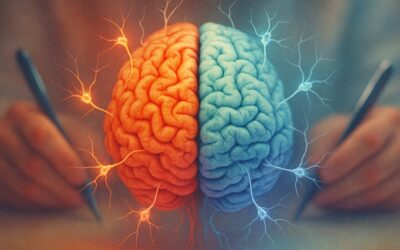- The Gist
- How Does Music Affect Our Brain?
- 1. Music and Emotion: The Brain’s Emotional Soundtrack
- 2. Boosting Memory and Learning
- 3. Reducing Stress and Anxiety
- 4. Enhancing Focus and Creativity
- 5. The Science of Music Therapy
- 6. Music and Social Connection
- The Bottom Line: Why You Should Add Music to Your Life
- Let’s Talk
- Let’s Learn Vocabulary in Context
The Gist
How Does Music Affect Our Brain?
Music has long been a part of human culture, but it’s only in recent years that science has begun to unravel its profound effects on the brain. Whether you’re listening to classical, jazz, or pop, music taps into the deepest parts of our minds, altering how we feel, think, and even behave. But how exactly does this happen?
1. Music and Emotion: The Brain’s Emotional Soundtrack
Music is deeply intertwined with our emotions. When we listen to a song we love, the brain releases dopamine, the “feel-good” chemical, leading to sensations of happiness, excitement, or nostalgia. Studies have shown that specific rhythms and harmonies can evoke emotions, even without lyrics. For example, slow tempos and minor keys are often associated with sadness, while upbeat rhythms in major keys are linked to feelings of joy and energy.
2. Boosting Memory and Learning
Have you ever found that it’s easier to memorize facts with a catchy tune? Music has a unique way of enhancing memory and learning. The brain’s hippocampus, which is responsible for memory formation, is highly active when listening to music. This explains why music is often used as a mnemonic device to help people remember things—think about how children learn the alphabet through song. In fact, research suggests that individuals with Alzheimer’s disease can recall memories more easily when prompted with music from their past.
3. Reducing Stress and Anxiety
Music is also a powerful stress reliever. Soothing music, such as classical or instrumental pieces, has been shown to lower cortisol levels, the hormone associated with stress. It’s no wonder people turn to music during stressful moments—whether it’s studying for an exam or winding down after a long day. The calming effects of music can also aid in lowering heart rates and reducing anxiety, making it an essential tool for relaxation.
4. Enhancing Focus and Creativity
Some people claim they do their best work while listening to music. The right type of music can improve focus and boost creativity, particularly instrumental or ambient music, which lacks distracting lyrics. Background music creates an environment that enhances concentration, allowing individuals to enter a state of flow where creativity flourishes. This effect is particularly beneficial in tasks that require problem-solving or out-of-the-box thinking.
5. The Science of Music Therapy
Music therapy is an emerging field that leverages the brain’s reaction to music for therapeutic purposes. Used to help patients with conditions ranging from autism to PTSD, music therapy has been shown to improve communication skills, emotional well-being, and even physical coordination. The structured rhythms in music help regulate neurological patterns, making it easier for the brain to process complex emotions or recover from trauma.
6. Music and Social Connection
Music is a universal language, bringing people together across cultures and generations. The act of playing or listening to music in groups releases oxytocin, known as the “bonding hormone,” which strengthens social connections. From concerts to community choirs, music has the ability to foster a sense of unity and belonging, reinforcing its role as a powerful social tool.
The Bottom Line: Why You Should Add Music to Your Life
Whether you’re using it to boost your mood, enhance focus, or simply relax, music has a profound effect on the brain. By understanding how different types of music influence various aspects of cognitive and emotional functioning, you can harness the power of sound for personal growth and well-being.
Next time you hit play on your favorite song, remember: you’re not just enjoying a tune—you’re giving your brain a workout.
Let’s Talk
So, we’ve talked about how music can change our mood, boost memory, and even reduce stress, right? But let’s dive a bit deeper, because music’s impact on our brains is honestly mind-blowing when you think about it. Have you ever been stuck in traffic, super frustrated, and then your favorite song comes on? In an instant, you feel lighter. It’s like magic, but it’s not—it’s science! Your brain is actually rewiring itself in real-time to reduce stress, just by listening to a good tune. Isn’t that incredible?
And let’s not forget those goosebumps. You know, that spine-tingling sensation you get when a song really hits you? What’s going on there? Well, that’s your brain’s way of rewarding you. When you hear a song that moves you, your brain releases a surge of dopamine, the same chemical that’s released when you eat something delicious or accomplish something great. It’s like your brain saying, “Yes! This is what I needed!”
But here’s something that wasn’t mentioned earlier—music’s ability to change our perception of time. Have you ever noticed that time flies when you’re listening to music you love? On the flip side, a boring song can make time drag. It’s fascinating how the brain processes rhythm and tempo to either speed up or slow down your perception of time. This is why gyms blast upbeat music during workouts. The fast beats trick your brain into thinking you’re breezing through a workout, even when you’re sweating bullets.
Now, think about focus. We talked earlier about how music helps with creativity and concentration, but here’s the trick: not all music works the same way for everyone. Some people need total silence to focus, while others can’t function without a bit of background noise. Personally, I find instrumental music perfect for when I need to write or work on something complex. Lyrics distract me because I start paying attention to the words instead of my task. Have you ever found yourself singing along to a song when you were supposed to be focusing? Yeah, me too.
One area we didn’t touch on earlier is how music affects sleep. If you’ve ever struggled with insomnia, you know how frustrating it can be. But have you tried listening to calming music before bed? Research shows that slow, soothing music can help you fall asleep faster and enjoy deeper sleep. I’ve tried it myself, and let me tell you, it works wonders. The right playlist can be like a lullaby for grown-ups, helping your brain wind down and get into sleep mode. So, next time you’re tossing and turning, maybe skip counting sheep and try a mellow playlist instead.
And let’s talk about how music brings people together. I’m sure you’ve experienced this—you’re at a party, someone puts on a song everyone knows, and suddenly, the entire room is singing along. It’s like an instant connection, a shared experience that brings complete strangers together. That’s the power of music—it’s a universal language. It makes you feel like you belong, even if just for a moment.
What’s also cool is how certain songs become the soundtrack of your life. There are songs that remind you of specific moments—maybe a song from your high school days, or that one tune that played at your wedding. Music has this incredible ability to transport us back in time. Just hearing those first few notes can flood your mind with memories, emotions, and experiences, almost like time travel through sound. Isn’t that wild?
So, what about you? How does music shape your day? Do you have a go-to song when you’re feeling down? Or maybe a playlist that helps you get into the zone when you’re working? I’d love to hear what role music plays in your life because it’s different for everyone. And the next time you listen to your favorite song, just think about all the incredible things happening in your brain—it’s doing so much more than just enjoying the beat!
Let’s Learn Vocabulary in Context
Let’s talk about some of the key words and phrases from our earlier conversation about how music affects the brain. You might have noticed a few terms that are not only interesting but also super useful in everyday life. For example, we mentioned dopamine, that “feel-good” chemical your brain releases when you hear a song you love. It’s like your brain’s way of rewarding you, kind of like when you eat your favorite dessert. You can think of dopamine as your brain’s personal cheerleader. And hey, next time you’re explaining why music makes you feel so great, you can drop some knowledge by saying, “It’s the dopamine rush!”
Another word we touched on is hippocampus. Sounds a bit fancy, but it’s just a part of your brain that’s crucial for forming memories. Remember how music can trigger memories? That’s your hippocampus working behind the scenes, pulling out old memories whenever a familiar song plays. It’s almost like your brain has a built-in music library that links tunes to life events. You can use this word when talking about memory in general, like, “I think my hippocampus is acting up because I can’t remember where I put my keys!”
We also talked about flow state, which is when you’re so focused on what you’re doing that you lose track of time. Music can help you get into this zone where everything else fades away, and you’re just in the moment. You’ve probably experienced flow state when you were completely absorbed in a task, like writing or drawing, and suddenly realized hours had passed. It’s a great phrase to use when describing moments of deep focus, like, “I was in such a flow state while studying that I didn’t even hear my phone ring.”
Then there’s mnemonic device, which sounds complicated but is actually a simple trick we use to remember things. Think about how kids learn the alphabet through a song—that’s a mnemonic device in action. You can use this term when explaining any method you use to jog your memory, like, “I always use a mnemonic device to remember my grocery list!”
Lastly, we can’t forget neuroplasticity, the brain’s ability to change and adapt. It’s one of the reasons why music can have such a powerful impact on us—our brains are constantly reshaping themselves in response to the things we hear and experience. You can use neuroplasticity in casual conversation when talking about learning new things, like, “Thanks to neuroplasticity, my brain is getting better at juggling all these new skills!”
Now that we’ve explored some of these key terms, how do you think you can apply them in your own life? Maybe you can start paying attention to when your brain releases dopamine or notice when you’re in a flow state. Have you ever used music to help you remember something, like a mnemonic device? Or perhaps you’ve thought about how neuroplasticity plays a role in learning new habits or skills?
So, here’s a couple of questions to keep the conversation going: What’s a song that instantly triggers a memory for you, and why do you think that happens? And have you ever noticed how different types of music affect your ability to focus or relax? Let’s talk about it!










0 Comments